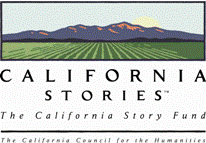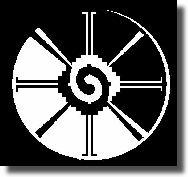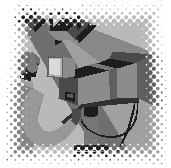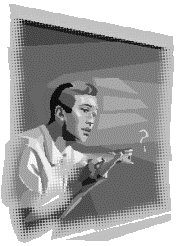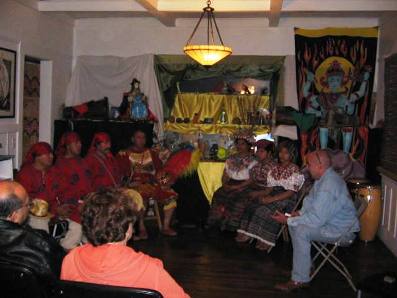Saturday
03/05/05: 5-7 PM Hunab Ku Program
TE ESPERO
ESTE SABADO DEL OTRO LADO DEL RIO
Te esperamos
este mismo SABADO 5 DE MARZO to share the blessings from the Ventura family
y toda la magia from the California Stories and the Mayan dances Ajpop
Tecun and this very time to celebrate the coming into our Mother Earth
of CITA and the iceman commet
Oo sea que,
from 5 to 7 a Mayan Gathering,
from 7pm: THE SOUP con la marimba de Alexis Diaz
and at 9 PM Cita y Ricardo
PEACE
Saturday:
02/05/2005: 5-7 PM Hunab Ku Program
The Mayan
community in Los Angeles is the focus of this project, which will use
already established monthly community gatherings to share the stories
of two families within the community.
The stories,
which will be gathered using video, photography and audio, will be presented
to the general public at the annual Eco Maya Festival in April 2005, a
multicultural environmental festival attended by thousands of people.
The stories
will be gathered from two families: the Ventura family, one of whose members
is a Mayan priest with generations of memories and traditions from his
native Guatemala, and the Quezada family, one of whose members –
Roberto Quezada -- is a well-known Guatemalan writer.
Saturday:
01/01/2005: 5-7 PM Hunab Ku Program
7 PM: New Year Celebration.
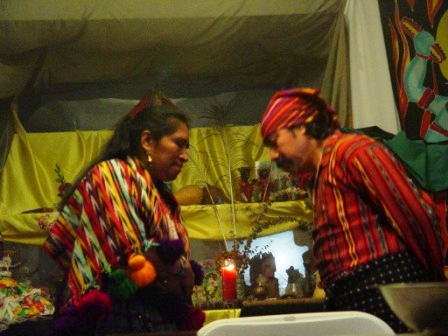
Alicia
y José Ventura: danza tradicional
Saturday,
December 4, 2004
5 to 7 PM:
AJPOP TECUN PROGRAM:
Hunab Ku;
gathering Quezada-Ventura families:
“El
Patio de Maria” at 6136 Romaine Street, LA, CA 90038
The oral traditions, the music and the dances from the Mayan community
of Los Angeles came from the creation of the Maya, as well as the mathematical
mysteries of the Time-Message that the designers-priests left with the
Geometric PI Value of 3.146264371 and how it relates to the Decimal System.
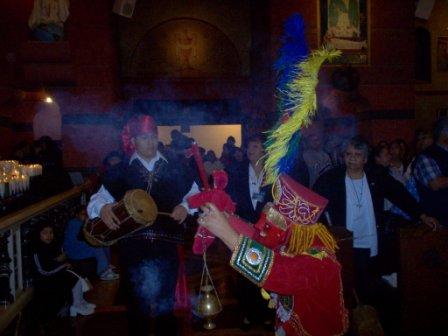
Aj-pop
tecum by the altar
7
to 12 PM: NOTICIAS DEL MUNDO PATIODROME:
Cuban dinner and all you can drink ($20).
CITA and Ricardo Ochoa performing.
Galo Nuñez singing his Latin-American songs.
Your choice of meat (Picadillo), chicken (Fricase de pollo) or Salmon.
Cuban food and all you can drink. $20
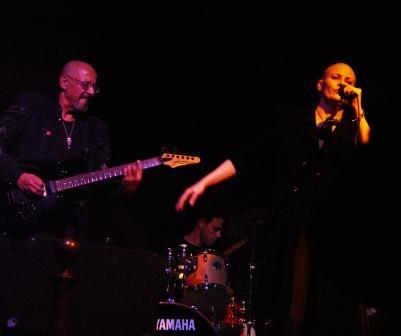
Cita
& Ricardo Ochoa
photo
by Rafael Esparza
|
The on line release
of the Afrocuban Anthology Winter Journal 2004 at www.afrocuba.org
http://www.afrocuba.org/patio.htm
|
There are over
two million Mayan people of Los Angeles. Mayas came from the Southern
territories of Mexico: Yucatan, Campeche, Tabasco and Chiapas, as well
as Quintana Roo, El Salvador, Guatemala, Honduras, Nicaragua, Costa
Rica and Belize.
The Eco Maya programs of Stage Of The Arts, Inc. (S.O.T.A), seek to
improve and provide working and living space for aborigines’ cultures,
artists, writers and musicians. Year around meetings, workshops, cultural
events and community gatherings are open to the general public, including
visiting scholars and seminars on sustainability conducted at our home
base in Los Angeles EcoVillage with physical locales at 127 ½
and 117 South Bimini Place, Los Angeles, California 90004.
We are approximately 3 miles west of downtown on Bimini and White House
Place, one block east of one of LA’s most auto congested traffic
corridors, Vermont Avenue.
The two blocks mixed use working class neighborhood has a rich geological
and social history. Home of the historic Bimini Baths from 1901 to 1951,
the Bimini Slough also wended its way around the neighborhood. The old
red trolley car, destroyed in the 50’s, had its turn-around on
Bimini Place as well. Approximately 500 persons live in 13 historically
significant apartment buildings consisting of 164 units of housing.
An alcohol and drug recovery home serving approximately 100 persons
is also located on the block along with two auto repair shops, a K-2
public school, the Bresse Foundation and Youth Center, the Mijoo Peace
Church and a public adult school for English as a Second Language. Virgil
Middle School is located immediately north of Ecovillage.
As a culmination of our year around organizing and promotional activities,
ECO Maya produces and presents the only Latino environmental arts festival
that re-enforces the need to create awareness of environmental networks
and resources for urban community through cultural heritage.
ECO Maya Festival, an environmental hemispheric event, connects the
indigenous cultural heritage of the Americas, with the urban mecca of
diversity, Los Angeles, California. A one of a kind event, the festival
provides a cross-cultural nesting environment where families join in
a two-day celebration of culture, education, entertainment, and fun.
The festival (directed by Julio Santizo) brings universal balance with
all cultures through the celebration of Mother Earth Day proposed to
be presented April 22 & 23, 2005 at McArthur Park in partnership
with the Sidewalk Vendors District and Mama’s Hot Tamales, projects
of the Institute For Urban Research & Development (IURD).
Hunab Ku is the
concept the ancient Mayans said is the gateway to other galaxies beyond
our sun. Gazing upon this concept allows you to transcend the barriers
of perception and time.
The Hunab is also an unit of length rediscovered by the researcher Hugh
Harleston Jr. who after leaving his position of professor at Rochester
University, moved to Mexico and living near the Teotihuacan Pyramidal
Complex for more than 25 years dedicated his life to find out what unit
of length was used by the designers-priests.
Hunab Ku rebuilt the world after three deluges, which poured from the
mouth of a sky serpent. The first world he created was inhabited by
dwarfs, the builders of the cities. The second world was inhabited by
the Dzolob, 'the offenders', an obscure race. The third and final world
Hunab Ku created for the Maya themselves.
The oral traditions, the music and the dances from the Mayan community
of Los Angeles came from the creation of the Maya, as well as the mathematical
mysteries of the Time-Message that the designers-priests left with the
Geometric PI Value of 3.146264371 and how it relates to the Decimal
System.
The Hunab Ku program will be gathering stories from the life of six
members of the Ventura family and six members of the Quezada family.
The lead storytellers will be Jose Ventura and Roberto Quezada.
Jose Ventura is a Mayan priest with generations of memories and traditions
to share from his native Guatemala, a family of talented dancers of
Ajpop Tecun that run into their Californian sons and daughters.
Roberto Quezada is a well recognized Guatemalan writer who will turn
77 next year, First Prize of Novel for “Ardillas Enjauladas”,
a journalist and translator who’s been living in Los Angeles since
1952 with his Californian family.
There will be interactive multimedia presentations in the frame of archival
research testimonials from the history of the Mayan world, in the frame
of those stories the Quezada and the Ventura family will share their
own stories and legacy.
The gatherings will be taken place at “El Patio de Maria”
a multidisciplinary center of information for multicultural researches
and documentation of contemporary Hollywood.
El Patio de Maria is home of the AfroCuban Research Institute at 6136
Romaine Street just off Vine, both programs of Stage Of The Arts, Inc.
The program will be offered in Mayan Quiche, Spanish and English languages.
2. Audience
and outreach:
The first Saturday
of every month, a gathering occurs from noon to midnight at “El
Patio de Maria” with several formats developing from documentary
films to music and theatrical performances, art exhibitions, books reviews
and multimedia lectures since April 2004.
The actual events are documented at www.afrocuba.org/patio.htm as well
as by The
Los Angeles County Cultural Calendar at Experience LA, Cultural Treasures
and Regional Transit.
The participants and the audience go from twenty to one hundred escalating
during the day. The Hunab Ku program will begin on December 4, 2004
and the recurred Saturdays until April 2004.
El Patio is hosted by the performer CITA and the researcher Maria Esther
Ortiz in a whole-day interface between artists, writers and active audiences.
The wall between the stories and the storytellers is very narrow and
the audiences become participants from one set to the next.
The story-demonstrations presented here are to be recorded by photography,
video and spoken word, …a mix- media digital document will be
written under the artistic direction of Jorge Luis Rodriguez and will
develop into a digital electronic sequence for a website application.
By Saturday, April 22nd and Sunday 23rd, an on going presentation of
the developed program will be staged at the 11 Annual Eco Maya Festival.
The symbol of Hunab Ku will become the theme of the 2005 Eco Maya Annual
Festival and will be printed on thousands of t-shirts available during
the two days event that brings together a very diverse audience of 15
thousand at the Hollywood hills of the Barnsdall Arts Park and the campus
of Los Angeles City College during the last decade.
The actual media and marketing resources of the AfroCuban
Research Institute at “El Patio de Maria” and the media
outreach and specific promotion from the Eco
Maya Festival will be carrying the visual and the conceptual dimension
of the transnational Mayan communities of California.
3. Outcomes:
Our short-term
goal for the fiscal year 2003-2004 was to facilitate the transnational
and multidisciplinary studies from the AfroCuban Research Institute
into the developing of the ECO Maya network of transnational communities.
The Hunab Ku project will allow serving as a demonstration of the large
Central American convergence of Caribbean and Central American transnational
convergences in contemporary California.
Hunab Ku is just a methodology of dialogue; maybe unexpected representations
will become a very relevant story by the end of this re-creation of
oral history.
Our long term goal is the expansion of our actual experience on working
and living at the Los Angeles Ecovillage: the development of ECO Maya
Village; an ecological Mayan cultural environment to host an artist’s
community, including residents and non-resident members.
The Eco Maya Survey may be reviewed at http://www.afrocuba.org/ecomaya.htm
The mayor advantage of enlarging our understanding of California and
what it means to be a Californian will be the comprehension of the TRANSCULTURALIZATIONAL
lines of international relations according to the thesis of the Cuban
scientist Fernando Ortiz, versus the understanding of ACCULTURATION
as one culture is to be assimilated by the “superior culture”
of the slave master (Powel, 1889).
The ethnocentric traps of promoting the “acculturation”
are a severe post-colonial crisis of Cultural Anthropology nowadays.
As expressed by Don Fernando Ortiz in 1940: "We understand that
the word transculturation better’s the different phases of the
transitive process of one culture to another, because this doesn't only
consist on acquiring a different culture that is in rigor it indicates
the Anglo-American voice of " acculturation ", rather than
the process which also implies not necessarily the loss or eradication
of a precedent culture”.
4.Project
personnel:
Maria Esther Ortiz
is the Editor of www.AfroCuba.org, a website published by Stage Of The
Arts, Inc., and will serve as the Hunab Ku Project Director. She will
perform editorial assignments, collaborate on the design, research and
production of the project, conduct the public presentations and maintain
the project budget.
She has a J.D. from Havana Law School, PhD in Business Law from the
University of Havana, Cuba. She has experience with community cultural
programs, radio and TV cultural programs. She can be reached at: 6136
Romaine St., Los Angeles. CA 90038. (323) 960-0389. Email: Ortiz at
afrocuba.org
Roberto Quezada
is a writer and journalist. Winner of the National Prize of Novel in
Guatemala in 1983; he was born in that Central American country in 1928.
From 1952 he lives in the United States, where he writes novels and
stories, he is translator and proprietor of the “Libreria Hispanoamerica”
bookstore in the area of McArthur Park, Los Angeles. His role: to tell
the story of Quezada family in California and provide for interpretative
services for links between life and literature; roots, traditions, dreams
and experiences. Quezada is an excellent storyteller; he is the host
of “Roberto Quezada y sus libros” en “El Patio de
Maria en Hollywood”. He can be reached at: 2502 W 6th Street,
Los Angeles, California 90057. (213)384-6084. Email: robertoq at aol.com
José Ventura
is from Guatemala. He is a Mayan priest, with the knowledge of nature,
history, legends and traditions to share from his native country. He
is a Director of talented dancers of Ajpop Tecun, Mayan dances from
Guatemala, which run into their Californian sons and daughters. His
role is as culture bearer of the Mayan traditions, as a bridge between
the ancient roots and the present. He can be reached at (213) 250-3249
or josevsiguensa at sbcglobal.net, Los Angeles, California.
José Leonardo
is the administrator and cultural facilitator for Ajpop Tecun dances
and music and will coordinate all activities and scheduling for the
Ventura family. He is a professional announcer and folklore promoter
into many cultural events in Los Angeles and the City of Glendale. He
can be reached at (818) 298-8918 or guatemaya0104 at hotmail.com, Los
Angeles, California.
Jorge Luis Rodriguez,
president of Stage Of The Arts, Inc. is the Director of the AfroCuban
Research Institute (www.afrocuba.org) in collaboration with Education
Opportunity Program of California State University in LA. He wrote several
studies of Afrocuban traditions. He has been full time journalist and
photographer for La Opinion Newspaper and News World Communications;
a researcher, with skills of written and verbal communications in Spanish
language. He will interview the Quezada – Ventura families, take
the record of histories and the edition of sound and images, also he
will write press releases and promotions. He is an experimented producer
and communicator. He facilitates public affairs and foster interdisciplinary
communications for multicultural communities. He is able to help design
an effective campaign. Coro Southern California Arts Leadership Fellow,
1996. He can be reached at: 6136 Romaine St. Los Angeles. CA 90038.
(323) 960-0389. Email: director at afrocuba.org
David Sandoval
is presently the Director of the Cal State L.A. Educational Opportunity
Program. An EOP graduate, Mr. Sandoval entered the program in 1969 as
a special admit student. During the 1960's, he was a student and community
activist (UMAS, MECHA, Brown Berets), combining his media talents with
his concern for community by writing and producing short video and film
documentaries. His credits include "Guadalupe" and "Una
Nacion Bilingue" for the national PBS "Realidades" series.
He also served as National Coordinating Producer for "Infinity
Factory," a PBS series on math, targeted to Black and Latino children.
In the late 70's, he co-hosted and produced a weekly cultural and public
affairs radio show entitled "La Vida Latina" for KPFK-FM,
a Pacifica station.
In 1971, Sandoval co-produced the first Los Lobos album "Los Lobos
Del Este De Los Angeles: Just Another Band From East L.A."
He has traveled extensively throughout Europe, Mexico, and what was
the former Soviet Union, and sometimes leading EOP students on study/lecture
tours to Chiapas, Cuba and Selma, Alabama.
Mr. Sandoval has a Bachelor's Degree in Chicano Studies and a Master's
Degree in Education from Cal State L.A. He also attended UCLA, taking
graduate course work in motion picture and television production. He
has completed all coursework in the doctoral program in Educational
Management at the University of La Verne. He can be reached at: Educational
Opportunity Program, California State University in Los Angeles. 5151
State University Drive, Los Angeles. California 90032. (323) 343-3000.
Email: davids at cslanet.calstatela.edu
5. Sponsoring
organization
Stage Of The Arts,
Inc. is a grassroots arts and humanities organization, a non-for profit
501 (c) (3) California Educational corporation founded June 15, 1982
in the MacArthur-Echo Park neighborhood.
Arts education and cultural activities are our working tools to promote
social change and community gathering in the City of Los Angeles. The
Board of Directors has empowered its constituency to operate a variety
of programs during the last two decades: E.g.: Rock-A-Mole musicians
working for universal healthcare and living wages. (1994-present) Power
of Music workshop for self-production of public events (1994-present).
UNITY Arts Center of Westlake (1994-98) in public/private partnership
with the City of LA Cultural Affairs Department and “Teatro Studio
Jorge Negrete” (1985-89) providing a physical locale for artistic
and educational development.
Each program has been operated by an organizing committee or an operating
board.
Our Board of Directors, made out of Latino writers, artists and community
activists, fosters leadership development within our organization by
applying “consensus decision making” among each level of
participation.
Since 1995 the actual programs of SOTA are grouped into the ECO Maya
committee (100 members) and the AfroCuban Research network (412 registered
members).
6. Timeline
Saturday December
4, 2004:
5 pm, Phase 1, Hunab Ku; gathering Quezada-Ventura
“El Patio de Maria” 6136 Romaine Street, LA, CA 90038
Contact: Jorge Luis Rodriguez (323) 960-0389 or Ecomaya2004@aol.com
Second week of the month: Editing of documentation and media recording.
Third week: Digital design and web development.
Fourth week: Digital communications and internet uploading.
Saturday January
1, 2005:
5 pm, Phase 2, Hunab Ku; gathering Quezada-Ventura
“El Patio de Maria” 6136 Romaine Street, LA, CA 90038
Contact: Jorge Luis Rodriguez (323) 960-0389 or Ecomaya2004@aol.com
Second week of the month: Editing of documentation and media recording.
Third week: Digital design and web development.
Fourth week: Digital communications and internet uploading.
Saturday February
5, 2005:
5 pm, Phase 3, Hunab Ku; gathering Quezada-Ventura
“El Patio de Maria” 6136 Romaine Street, LA, CA 90038
Contact: Jorge Luis Rodriguez (323) 960-0389 or Ecomaya2004@aol.com
Second week of the month: Editing of documentation and media recording.
Third week: Digital design and web development.
Fourth week: Digital communications and internet uploading.
Saturday March
5, 2005:
5 pm, Phase 4, Hunab Ku; gathering Quezada-Ventura
“El Patio de Maria” 6136 Romaine Street, LA, CA 90038
Contact: Jorge Luis Rodriguez (323) 960-0389 or Ecomaya2004@aol.com
Second week of the month: Editing of documentation and media recording.
Third week: Digital design and web development.
Fourth week: Digital communications and internet uploading.
Saturday April
2, 2005:
5 pm, Phase 5, Hunab Ku; gathering Quezada-Ventura
“El Patio de Maria” 6136 Romaine Street, LA, CA 90038
Contact: Jorge Luis Rodriguez (323) 960-0389 or Ecomaya2004@aol.com
Second week of the month: Editing of documentation and media recording.
Third week: Digital design and web development.
Fourth week: Digital communications and internet uploading.
Saturday, April
23rd and Sunday 24th
Eco Maya Festival at Los Angeles Eco Village, (117-133 Bimini Place
& 1st. Street, one block East of Vermont Blvd.). Los Angeles. California
Multimedia, interdisciplinary performance from 10 am to 7 pm
Internet broadcasting and data compilation for multimedia interface.
Contact: Jorge Luis Rodriguez at (323) 707-7983 or Ecomaya2004@aol.com
Final web application
online by June 30 (end of fiscal year). Details TBA
Ecomaya2004 at aol.com and www.afrocuba.org/ecomaya.htm
www.ecomayafestivals.com
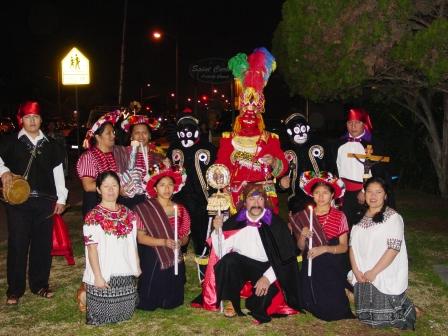
Ajpop
Tecum
|
